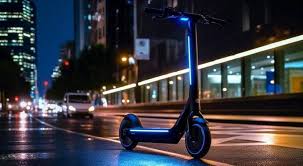In recent years, electric scooters have transformed from niche elektrische step legaal transportation options into mainstream mobility solutions. With their eco-friendly appeal and convenience, electric scooters have carved a unique space in urban landscapes worldwide. This article explores the evolution, benefits, challenges, and future prospects of electric scooters.
A Brief History
The concept of electric scooters is not new; early versions date back to the late 19th century. However, the modern electric scooter boom began in the early 2010s with the advent of companies like Bird and Lime, which introduced dockless sharing systems. These scooters offered a new way to navigate congested cities, appealing to eco-conscious consumers and tech-savvy urbanites.
Benefits of Electric Scooters
1. Environmental Impact
Electric scooters produce zero emissions, making them an environmentally friendly alternative to traditional gasoline-powered vehicles. By reducing the number of cars on the road, electric scooters help lower air pollution and decrease traffic congestion, contributing to cleaner urban air quality.
2. Cost-Effective Transportation
For many users, electric scooters are a more affordable option compared to owning a car or using ride-sharing services. With lower maintenance costs and no fuel expenses, they offer a cost-effective means of transportation. Many cities also have free or low-cost electric scooter sharing programs, making them accessible to a broader audience.
3. Convenience and Accessibility
Electric scooters are incredibly convenient for short-distance travel. They can easily navigate through traffic and are often quicker than walking or waiting for public transportation. Many scooters can be rented through mobile apps, allowing users to locate and unlock them with ease.
4. Health Benefits
While riding an electric scooter is not as physically demanding as cycling, it still encourages outdoor activity and can be a fun alternative to sedentary modes of transport. Riders enjoy fresh air and can easily incorporate a little exercise into their day, improving overall well-being.
Challenges Facing Electric Scooters
Despite their popularity, electric scooters face several challenges:
1. Safety Concerns
Safety is a significant issue for electric scooter users. Accidents involving scooters can occur due to reckless riding, poorly maintained vehicles, and insufficient infrastructure. Many cities are working to implement better regulations and infrastructure, such as dedicated bike lanes, to improve rider safety.
2. Regulatory Issues
Electric scooters often fall into a gray area in terms of regulations. Different cities have varying laws regarding where and how scooters can be used. Some places have implemented strict regulations, while others have yet to catch up, creating confusion for riders and providers alike.
3. Parking and Accessibility
The dockless nature of many electric scooters has led to complaints about improper parking. Scooters left haphazardly can obstruct sidewalks and create hazards for pedestrians. Some cities have initiated designated parking zones and incentivized responsible parking to address this issue.
The Future of Electric Scooters
The future of electric scooters appears bright, with continued advancements in technology and growing acceptance among urban populations. Some trends to watch include:
1. Improved Battery Technology
As battery technology advances, we can expect longer ranges and shorter charging times, making electric scooters even more convenient for users. The development of swappable battery systems may also help reduce downtime for fleet operators.
2. Integration with Public Transport
Cities are increasingly looking to integrate electric scooters with public transportation systems. By creating seamless connections between modes of transport, commuters can enjoy a more efficient and comprehensive travel experience.
3. Sustainability Initiatives
Many electric scooter companies are committing to sustainability, using eco-friendly materials and practices. As cities prioritize green initiatives, electric scooters will likely play a significant role in the development of sustainable urban transport networks.
Conclusion
Electric scooters are not just a passing trend; they represent a shift towards more sustainable and efficient urban transportation. While challenges remain, the benefits they offer—environmental sustainability, cost-effectiveness, and convenience—make them an appealing choice for many urban dwellers. As cities adapt and evolve, electric scooters are poised to play a crucial role in shaping the future of mobility.

